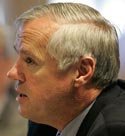Budget accord calls for $300 million more than governor proposed
CARSON CITY -- The capstone of the state's next two-year budget finally fell into place late Tuesday as lawmakers agreed to spend about $300 million more than Gov. Jim Gibbons had proposed on the state's higher education system.
After several days of stalled negotiations, legislators reached accord on a plan to cut higher education by 12.5 percent from the level budgeted in 2007, rather than the 36 percent cut Gibbons had suggested.
"I am pleased we were able to cut the governor's proposal by almost two-thirds," Assembly Speaker Barbara Buckley, D-Las Vegas, said in the subcommittee hearing that approved the decision unanimously Tuesday evening. "I think we proposed those reductions because we know that if we do not educate our kids, we will not get anywhere as a state."
If the higher education system's Board of Regents raises tuition by 10 percent over the next two years to bring in more money, the amount that the state's colleges and universities would have to cut would come down to about 10 percent.
Tuition rates are solely the regents' decision, but members of the subcommittee asked them to limit hikes to 10 percent in order not to burden students.
"Anything in excess of that would be inappropriate, in our opinion," Senate Minority Leader Bill Raggio, R-Reno, said.
In the budget Gibbons proposed in January, higher education took by far the largest hit of any state funding area. Gibbons proposed stripping $473 million from the system's $1.3 billion budget and cutting each of the two universities' budgets in half.
The legislators' agreement reduces higher education spending by about $165 million.
Dan Klaich, executive vice chancellor of the higher education system, said after the hearing that a 10 percent cut will not be without consequences for Nevada students, but it is far better than the worst-case scenario.
"I think under the circumstances we fared about as well as we reasonably could have expected," he said. "They obviously agonized about this decision. Within the available resources, I think they did everything they could to bring the cuts as low as possible."
The subcommittee also voted to cut a $20 million remedial education fund from the K-12 budget, an item they had previously held open in the vain hope they could find funding for it.
Legislators previously approved the other major pieces of state spending, including K-12 education, prisons, health care and welfare, and state employee salaries and benefits.
Although they made substantial cuts, the spending they deemed necessary is substantially more than Gibbons' $6.2 billion in recommended spending. It's not yet known precisely how much spending legislators have approved, but Senate Majority Leader Steven Horsford, D-Las Vegas, estimated it at "just south of $7 billion."
With only $5.5 billion in projected revenue from existing sources, including an already-approved $200 million increase in hotel room taxes, lawmakers now must figure out how to come up with more than $1 billion to fund their priorities.
Horsford told reporters there is no plan yet on the table, but legislators have some ideas that they will now work to put together into a revenue proposal.
"It will be a combination of new revenue and other methods to balance the budget," he said. "I'm not going to go into detail. We've got to sit down and figure it out."
Sources say leaders of the Republican minorities in both houses will not tolerate tax hikes totaling more than about $800 million, with the remaining money coming from sources such as local governments.
The Republicans, whose votes are needed because tax increases require a two-thirds supermajority, are demanding that tax increases come from existing sources, such as sales tax and business payroll tax, and that they expire after two years. The GOP is also said to be seeking other concessions in the form of policy legislation they want to see passed in exchange for helping Democrats pass a budget over an expected veto from Gibbons.
The higher education funding was scheduled to be finalized last Friday, but the decision had to be postponed when lawmakers couldn't agree on a spending target. Buckley and Horsford publicly sparred over the last percentage point and ended up splitting the difference.
"There are those who will try to find the differences between us," Horsford said in the hearing. "I would like to say without equivocation that this process has helped to unite us. We worked toward a common goal of funding for all of education."
With the legislative session scheduled to end June 1, legislators hope to pass the budget by May 21 to leave enough time in the 120-day calendar for a veto override.
The higher education system's Board of Regents is scheduled to meet Thursday to discuss and possibly act on the budget cuts. Topics under consideration include tuition and fee increases.
Chancellor Jim Rogers said it was too soon to tell what type of cuts the colleges and universities might sustain, such as layoffs, course reductions or the elimination of degree programs.
UNLV President David Ashley has scheduled a town hall meeting for today on campus to talk about the budget cuts with students, faculty and employees. Likewise, the College of Southern Nevada's president, Michael Richards, has scheduled campus meetings for Thursday and Friday.
Review-Journal writer Richard Lake contributed to this report. Contact reporter Molly Ball at mball@reviewjournal.com or 702-387-2919.























